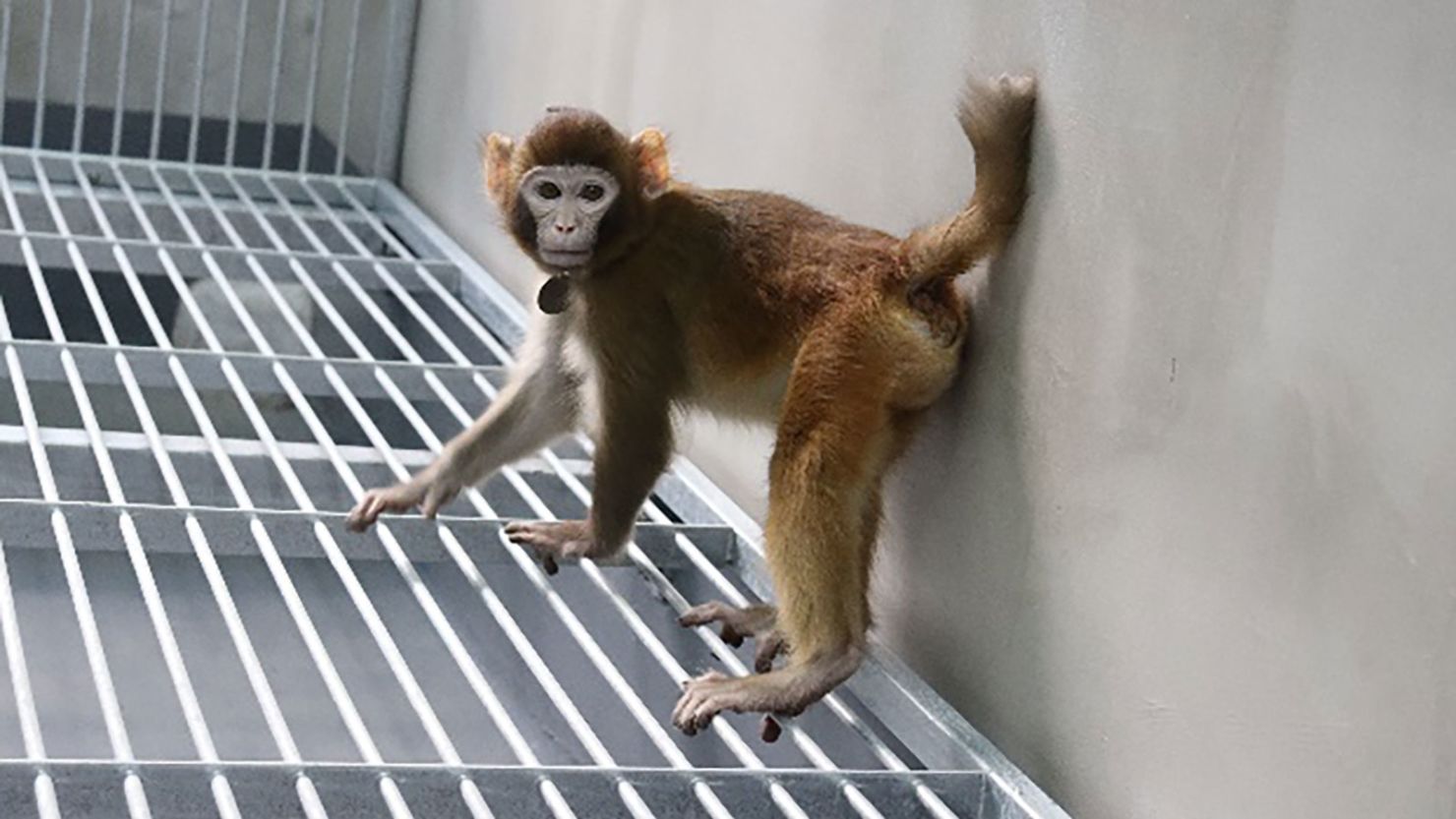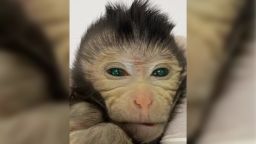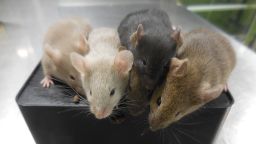New cloned monkey species highlights limits of cloning
By Katie Hunt, CNN4 minute read
Updated 10:25 PM EST, Tue January 16, 2024

The cloned rhesus monkey was named Retro is doing well, according to the research team.
Zhaodi Liao et al., Nature Communications
Sign up for CNN’s Wonder Theory science newsletter. Explore the universe with news on fascinating discoveries, scientific advancements and more.
CNN —
Meet Retro, a cloned rhesus monkey born on July 16, 2020.
He is now more than 3 years old and is “doing well and growing strong,” according to Falong Lu, one of the authors of a study published in the journal Nature Communications Tuesday that describes how Retro came to be.
Retro is only the second species of primate that scientists have been able to clone successfully. The same team of researchers announced in 2018 that they had made two identical cloned cynomolgus monkeys (a type of macaque), which are still alive today.
“We have achieved the first live and healthy cloned rhesus monkey, which is a big step forward that has turned impossible to possible, although the efficiency is very low compared to normal fertilized embryos,” said Lu, an investigator at the State Key Laboratory of Molecular Developmental Biology and Institute of Genetics and Developmental Biology at the Chinese Academy of Sciences. “Currently, we haven’t had the second live birth yet.”

Scientists create chimeric monkey with two sets of DNA
The first mammal to be cloned — Dolly the sheep — was created in 1996 using a technique called somatic cell nuclear transfer, or SCNT, where scientists essentially reconstruct an unfertilized egg by fusing a somatic cell nucleus (not from a sperm or egg) with an egg in which the nucleus has been removed.
Since then, scientists have cloned many mammalian species, including pigs, cows, horses and dogs, but the process has been hit or miss, with typically only a tiny percentage of the embryos that are transferred into surrogates resulting in viable offspring.
“In a way we have made much progress in that, after Dolly, many mammalian species were cloned, but the truth is that inefficiency remains a major roadblock,” said Miguel Esteban, principal investigator with the Guangzhou Institute of Biomedicine and Health at the Chinese Academy of Sciences. He was not involved in the latest research but has collaborated with some members of the research team on other primate studies.
Cloning a rhesus monkey
The Chinese team, based in Shanghai and Beijing, used a modified version of SCNT in their work on cynomolgus monkeys (Macaca fascicularis) and tweaked the technique further to clone the rhesus monkey (Macaca mulatta).During hundreds of failed cloning attempts, they realized that, in the early cloned embryos, the outer membrane that forms the placenta did not develop properly. To address this problem, they performed a process called inner cell mass transplantation, which involved putting cloned inner cells into a non-cloned embryo, and that allowed the clone to develop normally, Esteban explained.

Scientists create mice from two dads after making eggs from skin cells
The team then tested the new technique using 113 reconstructed embryos, 11 of which were transferred to seven surrogates, resulting in only one live birth, according to the study.
“We think that there might be additional…. abnormalities to be fixed. Strategies to further enhance the success rate of SCNT in primates remains …our main focus in the future,” Lu said
The first two cloned monkeys, Zhong Zhong and Hua Hua, are now more than 6 years old and live a “happy and healthy life” with others of the same species. Lu said thus far the researchers have not identified any potential limits on the cloned monkeys’ lifespan.
Zhong Zhong and Hua Hua are usually described as the first cloned monkeys. However, a rhesus monkey was cloned in 1999 using what researchers consider a simpler cloning method. In that case, scientists split the embryos, much like what happens naturally when identical twins develop, rather than using an adult cell like with the SCNT technique.
The implications of cloning monkeys
The researchers said that being able to successfully clone monkeys might help accelerate biomedical research given that there are limitations on what scientists can learn from lab mice. Research on nonhuman primates, which are closer to humans, has been pivotal to lifesaving medical advances, including the creation of vaccines against Covid-19, according to a report by a panel of the National Academies of Sciences, Engineering and Medicine released in May.The use of monkeys in scientific research is a contentious issue because of ethical concerns about animal welfare. The team said it followed Chinese laws and guidelines governing the use of nonhuman primates in scientific research.
The UK’s Royal Society for Prevention of Cruelty to Animals said it has “serious ethical and welfare concerns around the application of cloning technology to animals. Cloning animals requires procedures that can cause pain and distress, and there can be high failure and mortality rates.”
Being able to produce genetically identical monkeys could be useful, Esteban said.
“This research is proof of principle that cloning can be done in different non-human primate species and opens the door to new ways of enhancing the efficiency. Cloned monkeys can be genetically engineered in complex ways that wild-type monkeys cannot; this has many implications for disease modeling. There is also a species conservation perspective,” he added.
Dr Lluís Montoliu, research scientist at the National Center for Biotechnology (CNB-CSIC) in Spain who wasn’t involved in the research, said that cloning both species of monkey demonstrated two things.
“First, it is possible to clone primates. And second, no less important, it is extremely difficult to succeed with these experiments, with such low efficiencies,” he said in a statement.
He added that the low success rate of the process showed that “not only was human cloning unnecessary and debatable, but if attempted, it would be extraordinarily difficult and ethically unjustifiable.”
“Reproductive cloning a human being is completely unacceptable,” Lu said.


